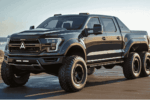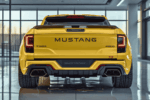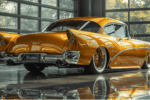The 1970 Chevrolet Chevelle Convertible is one of the most iconic representations of American muscle car culture. With its bold design, roaring big-block engine options, and open-top driving thrill, it perfectly captured the spirit of the era. The Chevelle stood as Chevrolet’s answer to the growing demand for high-performance vehicles that combined raw power with style and everyday usability. The convertible version added another layer of excitement, blending performance with the freedom of top-down cruising.
By 1970, the muscle car wars were in full swing, and Chevrolet decided to make a statement. The Chevelle SS, especially in convertible form, became a legend almost overnight. It was more than just a car it was an expression of confidence, attitude, and raw American engineering. Today, it remains one of the most admired and collectible vehicles from the golden age of muscle cars.
When Chevrolet Perfected the Muscle Car Formula
The 1970 model year marked a significant moment for the Chevelle lineup. Chevrolet had redesigned the car for 1968, but by 1970, it had refined the formula to perfection. The body was muscular yet elegant, featuring sculpted lines, a bold front grille, and the iconic dual headlamps. The rear carried the unmistakable SS badge for those who opted for the Super Sport package, signaling power that few cars could match on the road.
The convertible version added flair and exclusivity. While most muscle cars focused purely on performance, the Chevelle Convertible offered an experience that balanced speed with pleasure. Driving with the top down and the sound of a big-block V8 rumbling under the hood was pure magic. Only a limited number of convertible SS models were built, making them some of the rarest and most desirable Chevelles ever produced.
How the 1970 Chevelle Delivered Power and Performance
At the heart of the 1970 Chevrolet Chevelle Convertible was Chevrolet’s legendary big-block engine lineup. Buyers could choose from several powertrains, but the star of the show was the 454 cubic-inch LS6 V8. This monster engine produced an astonishing 450 horsepower and 500 lb-ft of torque, making it one of the most powerful production engines of its time.
The LS6 Chevelle Convertible was not just fast it was ferocious. With a well-tuned carburetor and high-flow exhaust, it could rocket from 0 to 60 mph in around 5.5 seconds, an incredible feat for a full-sized American car in 1970. The four-speed manual transmission gave drivers full control of the beast, while the heavy-duty suspension and power-assisted brakes ensured that performance didn’t come at the expense of handling or safety.
Even those who opted for smaller engines, like the 396 V8 or the 350 small-block, found that the Chevelle offered plenty of excitement. The power delivery was smooth yet forceful, and the convertible configuration made every drive an immersive experience. Whether cruising through town or roaring down a highway, the 1970 Chevelle Convertible made every mile feel alive.
What Makes the Design of the 1970 Chevelle Convertible So Iconic
One of the main reasons the 1970 Chevelle Convertible remains so beloved is its design. The car perfectly balanced aggression and elegance. The long hood, short rear deck, and wide stance gave it a muscular posture that looked fast even when standing still. The SS models featured blacked-out grilles, racing stripes, and cowl induction hoods that added both function and flair.
The convertible top added a sense of freedom that made the Chevelle even more appealing. With the roof down, its flowing lines looked even more dramatic, emphasizing the car’s proportions and powerful stance. The interior was equally well crafted, featuring comfortable bucket seats, a stylish dashboard with sporty gauges, and options like air conditioning and AM/FM radios that made it both practical and enjoyable.
The combination of chrome accents, bold color choices like Cranberry Red, Fathom Blue, and Forest Green, and detailed craftsmanship created a timeless aesthetic. It’s no surprise that decades later, the 1970 Chevelle Convertible still turns heads wherever it appears.
How the Chevelle Convertible Captured the Spirit of the 1970s
The 1970 Chevrolet Chevelle Convertible was more than just a performance car it was a symbol of American culture. The late 1960s and early 1970s were a time of optimism, change, and individuality. The muscle car became a reflection of that spirit, offering drivers a way to express freedom, power, and personal identity.
Owning a Chevelle Convertible meant embracing open roads, summer nights, and the roar of a V8 engine echoing through the countryside. It was a car that appealed to enthusiasts of all ages, from young drivers craving speed to older buyers appreciating the combination of luxury and performance. Chevrolet understood that appeal and delivered a car that could do it all.
Even today, when people think of classic American convertibles, the Chevelle is one of the first names that come to mind. Its blend of performance, design, and heritage has made it a permanent fixture in automotive history.
When the 1970 Chevelle Became a Collector’s Dream
Over the years, the 1970 Chevrolet Chevelle Convertible has become one of the most sought-after collector cars in the world. Its limited production numbers, combined with the sheer power of the LS6 and the timeless design, make it a highly desirable piece of automotive art. Enthusiasts and restorers alike invest countless hours and resources to preserve these machines, ensuring that their legacy lives on.
At classic car auctions, well-preserved or fully restored Chevelle Convertibles often fetch impressive prices. The LS6 models, in particular, command top dollar due to their rarity and unmatched performance. Collectors value them not only for their speed but also for what they represent—the golden age of American muscle cars.
Even replicas and tribute builds of the 1970 Chevelle Convertible are popular among enthusiasts who want to experience the thrill of this classic icon without the premium price tag. Whether original or recreated, the Chevelle’s charm and personality remain unmistakable.
How the 1970 Chevrolet Chevelle Convertible Continues to Inspire
More than fifty years after its debut, the 1970 Chevelle Convertible continues to influence modern muscle car design. Its blend of raw power, beautiful proportions, and driving excitement set a standard that many automakers still strive to match. Modern Chevrolets, like the Camaro and Corvette, owe much of their spirit to what the Chevelle represented a car built for performance, but equally for passion.
Restomod versions of the Chevelle have also become increasingly popular, combining the original’s timeless design with modern technology. Updated suspensions, fuel-injected engines, and digital interiors give this classic new life while maintaining its legendary character. It’s a testament to how well the original design has aged powerful, timeless, and endlessly admired.
Why the 1970 Chevelle Convertible Will Always Be a Legend
Few cars capture the soul of American muscle quite like the 1970 Chevrolet Chevelle Convertible. It was a car that dared to combine brute strength with open-air luxury, appealing to those who wanted the best of both worlds. Its design remains breathtaking, its performance thrilling, and its legacy unshakable.
To this day, hearing the deep rumble of a Chevelle’s V8 engine evokes an instant connection to a time when cars were raw, mechanical, and full of emotion. It’s not just nostalgia. it’s respect for a masterpiece of automotive engineering.
The 1970 Chevrolet Chevelle Convertible isn’t just one of the most iconic muscle cars ever made; it’s a celebration of freedom, power, and timeless American craftsmanship. For collectors, enthusiasts, and dreamers alike, it remains an enduring reminder of when the open road meant everything and driving was an experience to be savored.



